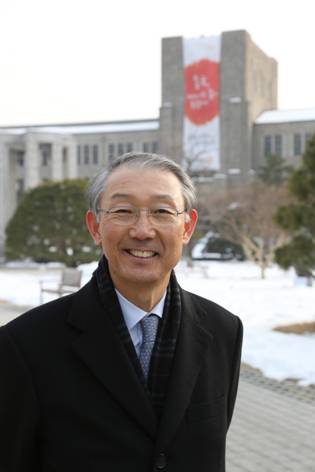 | ||
Part 1: His life
Q. When did you decide to make a Korean space rocket? And what was your original dream behind making it?I had no specific dream when I studied at Dongguk University. After getting my Doctoral degree, I entered the Electronics and Telecommunications Research Institute in Daedeok science town. One day, one of my seniors suggested “Will you like to work on rockets?” I consented and started to participate in developing a Korean rocket vehicle. I carried out an investigation into sounding rockets in my early days. After that, I concluded that a Korean space rocket was certainly needed. Therefore, I worked out a plan to develop a space rocket with my fellow colleagues. Our plan was approved by the government and we started the research in earnest unto the present day.
Q. Did you enjoy campus life? And what do you think about Dongguk University?When I was freshman and sophomore, I worked harder as a Buddhism club member than I did in my major subject. However, at the end of my 2nd year, I suddenly realized that I should be paying attention to my studies more than my student council activities. While I studied my electronics engineering major, I met Professor Yoon Hyon-bo, who was my academic advisor. Professor Yoon and I continuously built our relationship which we still have today. On launch day, I dreamed of meeting with him and enjoying the success of the Naro blastoff. For me, Dongguk University life is like a kind of vague nostalgia.
Q. Are you a devout Buddhist? If yes, what does Buddhism mean to you? Yes I am. I just try to live as an ordinary Buddhist.
Q. Do you have any life motto or philosophy of life?As the saying goes, “Life is suffering”. I think that life at its essence is a struggle. Ninety percent of life is hard, painful, and a tough thing. We need to live in the enduring, restraining, and waiting manner. In short, patience is a virtue.
Q. What does launching the Naro space rocket mean to you?I felt like I had passed a final exam that I had studied for the last 25 years.
Q. Most people expect the development of a Korean-based launch vehicle as a follow-up to Naro. What are your future plans? Do you wish to participate on the future project?Becoming an expert in the space rocket field is all thanks to the investment of the Korean Government. Not just myself, but also all of the rocket development team members surely consider building the Korean-based launch vehicle as our duty and responsibility. We will actively and sincerely work for the future project.
Q. What do rockets mean to you?
Space rockets have become my whole life, which I did not expect when I undertook this project at the beginning.
Part 2: Naro space rocket blastoff and the space era of Korea
Q. How did you feel when you were watching the complete Naro rocket lift-off?I felt that the work at which I was striving at for the past 10 years was done right. I am thankful for all of that time.
Q. When was your most nervous moment during those final nine minutes?The whole 540 seconds were tense moments.
Q. Did you ever hit a slump or what was your most touching moment when developing the Naro rocket vehicle?All of the work had the potential for crisis. There were difficult parts in the research and development area and the technology strength itself. In short, the technological prowess of Korea remains slightly insufficient. Our team was in trouble with almost all procedures especially in regards to technology development. Especially, the full-scale explosion accident that occurred when we made a kick-motor comes to mind. That was uncontrollable and an unexpected difficulty. I think that there is no royal road or shortcut in the research and development area. Researching whole things from the beginning in a calm and orderly way is the fastest and most certain way.
Q. There are many people who estimate that the Naro rocket launch is only a half?success because of the cooperation with Russia. What do you think about that?I think the story arose because Russia provided key engine technology. But, the saying that the Naro rocket launch is only a half-success is not right expression to use. The Naro blastoff is clearly and certainly successful. However, people should raise this question; did Korean researchers achieve the first-stage rocket technology which Russia provided through making the Naro rocket? To conclude, Korea still does not acquire first-stage rocket techniques completely. Moreover, Russia could not transfer technology because this is an international regulation. Our Naro R&D team learned to map out space rocket systems that nobody could teach to Korea, and developed the Naro space launch by ourselves.
Q. Finally, do you have any advice for Dongguk students?It probably sounds like a trite remark, but people should have faith and a moderate attitude. As mentioned earlier, it is important to embrace “Life is suffering” and live modestly. I think, if there is no failure, this confirms there is no challenge. If you do not challenge yourself due to being afraid of failure, we cannot achieve anything. Especially, if you are young, to challenge yourself is your own privilege.

